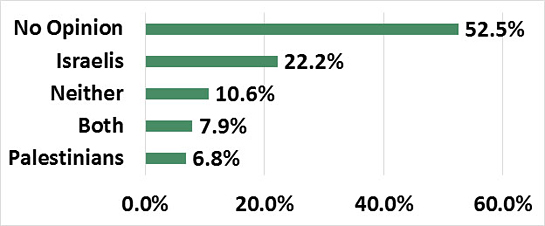On March 6 Gallup claimed 59% of Americans sympathized more with the Israelis and only 21% sympathized more with the Palestinians. The poll was part of a multi-question survey fielded by telephone. Gallup’s question was, "In the Middle East situation, are your sympathies more with the Israelis or more with the Palestinians?"
Gallup said this high purported level of sympathy for Israel was nevertheless below its 64% peak reported by Gallup in 2018. According to Gallup, US sympathy for Israel has now reached its lowest level since 2009.
For the second year IRmep fielded Gallup’s precisely worded sympathy question through the Google Surveys online platform between March 6-8 and once again received vastly different results.
IRmep Poll: In the Middle East situation, are your sympathies more with the Israelis or more with the Palestinians?

Source: IRmep representative poll of 1,003 American adults through Google Surveys on March 6-8.
A majority of Americans, 52.5%, far from expressing overwhelming – but declining – sympathy for Israel, claim that they hold "No opinion" on the matter. Only 22.2% of Americans said they sympathized more with the Israelis. This amount is less than the total number (25.3%) of Americans answering "Neither" "Both" and "Palestinians. The "Palestinians" response was 6.8%.
According to the single-question IRmep poll – conducted through the highly accurate Google Surveys platform – the number of Americans expressing "no opinion" on the matter has increased 3% since 2018. One reason may be growing discomfort with Israeli actions such as its indiscriminate use of deadly force in 2018 against Palestinian protesters in Gaza.
Another reason for the growth in "no opinion" responses may be reconsideration of long-held beliefs about the nature of Israel and its lobby among Americans. For example, the IRmep poll was fielded as the US Congress and Israel affinity groups reacted strongly to freshman Congresswoman Ilhan Omar’s (D, MN) references to the American Israel Public Affairs Committee (AIPAC) role in steering campaign contributions to pro-Israel candidates and promotion of state anti-BDS laws that require "loyalty" oaths not to boycott Israel in order for Americans to retain jobs and government contracts. Americans may have increasing uncertainty after witnessing the Israel lobby and its echo chamber’s harsh public reactions to such statements – duly repeated by most of Congress – which seem to verify claims about the lobby’s undue, massive and largely negative influence
In 2018 Gallup’s sensational claims of overwhelming, ever-increasing American sympathy for Israel experienced intense scrutiny when Gallup’s polling was first examined by IRmep and later The Forward. Both examined why the for-profit Gallup’s historic results are so drastically different than Pew Research – a not-for-profit polling organization – which has long fielded a similarly-worded phone survey.
Gallup suffered yet another blow to its credibility when IRmep released under the Freedom of Information Act Gallup studies produced under federal government contracts. Gallup was forced to pay a $10.5 million fine for making false claims and other corrupt practices in its polling contract work. Upon review of the government contract work, it seems plausible that Gallup may have sought over the years to unduly benefit from releasing and publicizing false polling results that touted high support for Israel early each year, in order to set the public opinion stage for AIPAC’s annual policy conference – the biggest annual US gathering of Israel supporters. Conference attendees leverage claims of overwhelming American public support to lobby members of Congress to pass the AIPAC legislative agenda during the week of the AIPAC conference. "Sympathy for Israel" numbers are also used as a proxy for ostensibly high popular support for giving foreign aid to Israel. However polls conducted over the past five years consistently reveal most Americans believe US foreign aid to Israel is either "too much" or "much too much."
Pew Research has not yet released 2019 figures about the level of American sympathy for Israel. In February Pew publicly grappled with transitioning away from increasingly obsolete telephone surveys of the kind still conducted by Gallup and moving to more modern and accurate online polling. One key problem Pew Research admits is that its online polling results will certainly contrast with legacy phone polling results and appear to be "apples to oranges" comparisons. Pew Research currently proposes indicating the transition in polling technology by separating phone poll data from online poll data with a dotted line in time series charts.
IRmep poll methodology and information about RMSE as a sampling error benchmark. Raw data and demographic filters are available from Google.
Grant F. Smith is the director of the Institute for Research: Middle Eastern Policy in Washington and the author of the 2016 book, Big Israel: How Israel’s Lobby moves America which is now available as an audiobook. IRmep is co-sponsor of the annual The Israel Lobby & American Policy Conference at the National Press Club, which takes place two days before the AIPAC policy conference.



